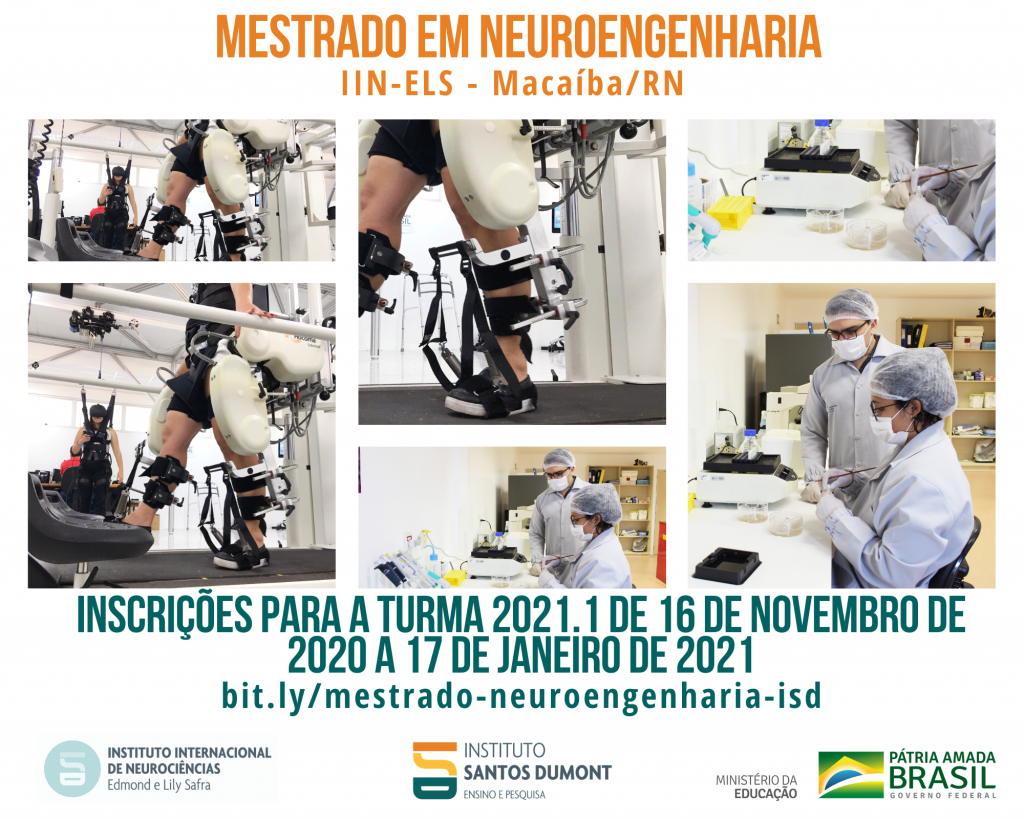
The Edmond and Lily Safra International Institute of Neuroscience (IIN-ELS), of the Santos Dumont Institute (ISD), opens this Monday (16) the registration period for the selection of the master's degree in neuroengineering – the first and only in Brazil in this area.
The notice is available on the Master's program page and provides a total of 10 vacancies, with classes starting on March 1, 2021.
Applications for the selection process will be accepted until January 17th. The announcement of successful candidates is scheduled for February 4th, 2021..
Check out the answers to the main questions about the master's degree in the gallery below
Does Covid-19 change anything?
There are no plans to change the calendar due to the COVID-19 pandemic. However, according to Fabrício Brasil – coordinator of the master's program – classes may start virtually, if necessary. By February, the master's program coordinator will reassess the epidemiological situation in the country and the state to define the format of the classes.
Possibilities such as videoconference interviews with pre-selected candidates and online registration – which were already foreseen in previous selections – are also considered in this notice.
Registrations
Since the last selection for the master's degree (2020.2), candidates must indicate which areas they have the most affinity with when registering. The application form presents eight projects developed at the Institute and asks which one(s) the potential student would like to have their application directed to.
Among the researched topics are “Control of brain connectivity by stimulation”; “Rehabilitation with the aid of neuromodulation”; “Mechanisms of formation, expression and modification of memories; “Animal experimentation related to cognition, more specifically, learning and memory” among others that can be checked in detail in the Letter of Intent.
The idea, according to Fabrício Brasil, is to identify affinities from the beginning to optimize the development of research when the student is in the field.
To apply, the candidate must electronically submit the application form and the Letter of Intent, in addition to observing the other procedures included in the selection notice.
Who can do a master's degree in neuroengineering?
The target audience for the selection process is candidates with undergraduate degrees in the health, engineering or biological fields.
The program has already received graduates from courses such as biomedical engineering, computer engineering, medicine, biological sciences, electrical engineering, computer science, nursing, biotechnology, civil engineering, control and automation engineering, chemical engineering, physiotherapy, psychology, biomedicine and speech therapy . Students come from different institutions and regions in Brazil.
Of the 10 vacancies foreseen in this selection, one is reserved for professors and employees of the Federal University of Rio Grande do Norte (UFRN) and two are destined for graduates of the Multiprofessional Residency in Health Care for People with Disabilities, from ISD.
About the course
The IIN-ELS/ISD master's degree in neuroengineering is offered free of charge, lasts up to two years and is the first in Brazil recommended by the Coordination for the Improvement of Higher Education Personnel (CAPES).
Since August 2013, when it began, the program has received 422 applications for selection and registered 114 entrants.
Classes and research are carried out at the IIN-ELS headquarters, in Macaíba (RN), a municipality located about 14 kilometers from the capital, Natal.
The Institute offers students free daily transportation between the two municipalities.
About IIN-ELS and the program
The Edmond and Lily Safra International Institute of Neuroscience (IIN-ELS) has been in operation since 2006 and develops teaching, research and extension activities in neuroscience and neuroengineering – two areas considered strategic for Brazil and the world.
The Institute's postgraduate program in Neuroengineering offers two lines of research (Brain-Machine Interface and Neuromodulation) and opens up prospects for professional activity linked to experimental, computational, theoretical, clinical and applied research, at molecular, cellular and systems levels.
There is room for the development of research and technologies in areas such as brain-machine interface, neuromodulation, computational neuroscience and signal processing, rehabilitation, brain-brain interface, prosthetics and orthoses, biocompatibility, neurodegenerative diseases, microcephaly, psychiatric diseases and cognition, among others.
Neuroengineering
Neuroengineering is an interdisciplinary research area that integrates neuroscience and engineering methods to study the functioning of the nervous system and develop solutions for the limitations and dysfunctions associated with the nervous system.
The knowledge generated in this area enables the development of technologies and applications ranging from neuroprosthetics to the improvement of neuromodulation techniques with therapeutic potential. The work uses behavioral, electrophysiological, histological and immunohistochemical approaches, combined with quantitative analysis methods.
The expectation is that the research developed will result in gains for society, such as the launch of cheaper prostheses for amputees, new forms of less invasive and lower-cost therapy for Parkinson's patients and the use of new technologies for the rehabilitation of paraplegic and quadriplegics.























